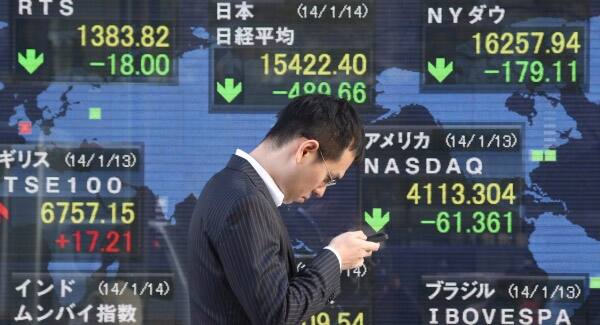Tokyo: Asian stocks fell on Thursday after US stocks retreated overnight and as Japan machinery orders unexpectedly shrank, deflating investors` appetite for riskier assets.
Concerns about slowing global growth also weighed on sentiment, with the New Zealand dollar tumbling after its central bank cut interest rates and signalled it may ease further, citing weakening demand and uncertainty over policy in the United States and China.
Tokyo`s Nikkei fell 3 percent, after jumping 7.7 percent the day before amid hopes for fresh government stimulus.
Japan`s key gauge of capital spending unexpectedly fell for a second straight month in July, signalling that the economy is struggling to get back on track after contracting in the second quarter.
MSCI`s broadest index of Asia-Pacific shares outside Japan was 0.9 percent lower after rallying 3.2 percent on Wednesday. Australian shares fell 1.9 percent and South Korea`s Kospi shed 0.5 percent.
Investors are awaiting China inflation data later in the session for further clues on the health of its economy.
U.S. stocks rose early on Wednesday on hopes of more stimulus measures in China but retreated later in the session amid declines in shares of Apple and energy stocks, which were dragged down by plunging oil prices.
The S&P 500 ended down 1.5 percent and futures slipped another down 0.3 percent in the Asian day.
"Speculation about fiscal policy support from China and Japan failed to sustain the rally in risky assets," wrote strategist at Barclays.
"Although volatility has decreased in the past few days, uncertainty about the global economic slowdown, potential outflows in troubled emerging markets, and the policy response from major central banks is here to stay for the foreseeable future," they said.
Elsewhere, Standard & Poor`s stripped Brazil of its investment-grade credit rating on Wednesday, further hampering President Dilma Rousseff`s efforts to regain market trust and pull Latin America`s largest economy out of recession.
The latest policy response to rising global risks came from the Reserve Bank of New Zealand, which cut interest rates by 25 basis points to 2.75 percent early on Thursday and signalled further easing as the economy faced slowing growth.
While the rate cut was widely anticipated, the central bank also said a further fall by the New Zealand dollar was "appropriate", sending the kiwi buckling.
The New Zealand dollar dived more than 2 percent and last fetched $0.6266 , moving back towards a 6-year low of $0.6200 struck late in August.
The Australian dollar suffered collateral damage and retreated 0.7 percent to $0.6967 .
Elsewhere in currencies, the dollar slipped in line with the dent in investor risk appetite and was down 0.2 percent at 120.30 against the safe-haven yen.
The euro edged up 0.1 percent to $1.1215 .
Commodities highlighted lingering concerns about global growth, with U.S. crude oil sliding nearly 4 percent overnight.
U.S. crude stood little changed at $44.16 a barrel.
Oil prices are off more than 50 percent since June 2014 with a global supply glut also weighing heavily on the commodity
In recent weeks, oil rallied in volatile trading after falling to 6-1/2-year lows when a stock market slide in China sent global equities and commodities prices tumbling.
















